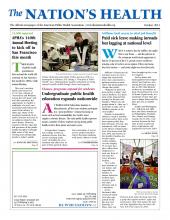Spending time with parents is tied to a teenager’s well-being and feelings of self worth, a recent study found, with many teens actually seeking out time with their mother and father.
“The stereotype that teenagers spend all their time holed up in their rooms or hanging out with friends is, indeed, just a stereotype,” said study lead author Susan McHale, PhD, professor of human development and director of the Social Science Research Institute at Pennsylvania State University. “Our research shows that, well into the adolescent years, teens continue to spend time with their parents and that this shared time, especially shared time with fathers, has important implications for adolescents’ psychological and social adjustment.”
The study found time with fathers was particularly powerful for adolescents. According to the study, published Aug. 21 in Child Development, teens who spent more time with their fathers with other people present had better social skills with fellow teens. And those who spent more time alone with their fathers had higher self-worth.
Researchers conducted home and phone interviews over a seven-year time span with mothers, fathers and the two oldest children in about 200 families. The children reported on their social skills with peers and their general sense of self-worth. At the beginning of the study, the older children were about 11 and the younger about 8.
In the two- or three-week period after each home visit, the study authors conducted a series of seven nightly phone interviews in which they asked teens about their daily activities and who was with them during those activities. The adolescents told researchers that while parent-teen time when other people were present declined from the early to late teen years, parent-teen time with just the parent and the child present increased in early and middle adolescents.
“This suggests that, while adolescents become more independent, they continue to have one-on-one opportunities to maintain close relationships with their parents,” McHale said.
The study found that the decline in time teens spent with their parents when others were present was less pronounced in second-born than first-born children.
The study also found that teens who spent more time with their fathers with other people present had better social skills with their peers. Teens who spent more time alone with their fathers had higher self-esteem.
“An important direction for future studies is to examine the distinct roles of mothers versus fathers and how non-scripted parental behaviors, such as high involvement of fathers in childrearing, are linked to youth adjustment,” the study’s authors wrote.
They also said a number of possibilities could explain why the study did not find mothers’ time with teens was tied as strongly to positive mental health as time with fathers.
“First, at least in two-parent families the mothers’ role as caregiver is so scripted that her involvement can easily go unnoticed and unacknowledged,” the study’s authors wrote.
Previous studies also have found fathers’ interaction with children tends to be more playful, and fathers are more likely than mothers to be involved with children during leisure time. Also, “mother-child shared time may be linked to other domains of adjustment that were not included in this study.” For example, a previous study found boys who spent more one-on-one time with their mothers but not their fathers were less depressed.
The current study also found both mothers and fathers spent more time alone with a child of their same gender when they had both a daughter and a son.
“Future researchers should explore how the time parents and youths spend on different activities changes over time and has implications for youth adjustment,” the study’s authors wrote.
The study, funded by the Eunice Kennedy Shriver National Institute of Child Health and Human Development, is online at http://onlinelibrary.wiley.com/doi/10.1111/j.1467-8624.2012.01826.x/abstract.
- Copyright The Nation’s Health, American Public Health Association









